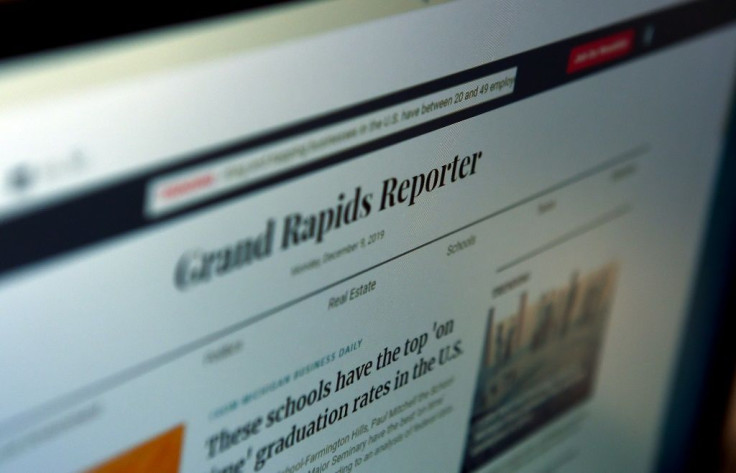Partisan News Outlets Seek To Fill Void In US 'News Deserts'

Open the website of the Kalamazoo Times of Michigan and you will see a smattering of articles such as might be found on the sites of any number of news organizations.
But a closer look reveals there are no ads or subscription offers, and many of the articles are weeks old or simply press releases for various organizations.
The site is nearly identical to more than a dozen others in Michigan such as the Lansing Sun, Battle Creek Times or Grand Rapids Reporter, all part of a group linked to conservative political activists.
The Michigan websites are among hundreds launched by political organizations across the United States, in many cases mimicking the appearance of established news organizations without disclosing their ownership or funding.
These sites aim to fill the void in what has been described as "news deserts" created by the disappearance of local news outlets struggling to keep pace in the new digital landscape.
Some 40 sites in Michigan are part of a network operated by the Metric Media Foundation, a group headed by conservative political consultant Bradley Cameron.

The group, which did not respond to an AFP request for comment, said on its website it funds hundreds of local news sites using a "database of public information" and "free-lance reporters around the country who adhere to strict journalistic standards."
Although they don't circulate hoaxes or blatantly false conspiracy theories, the partisan bent may confuse readers.
The proliferation of these sites creates "a tremendously difficult time for citizens to figure out what to believe," said Kathleen Culver, head of the University of Wisconsin's Center for Journalism Ethics.
While there is nothing inherently wrong with politically driven news organizations, Culver said that "some of these efforts are trying to hide their partisanship by using the forms of journalism without the norms of journalism."

Dartmouth University professor Brendan Nyhan says these "impostor sites" pretend to be news organizations without the varied and balanced coverage most people expect.

"The prevalence of these impostors is likely to increase as the 2020 election approaches, threatening to mislead more voters and to promote greater skepticism toward all news media, including the local outlets that so many Americans rely on and trust," Nyhan said in a New York Times essay.
The surge in partisan news outlets comes with the legacy media in the throes of a horrific slump which has seen the loss of some 2,000 local newspapers and the loss of one-fourth of newsroom jobs over the past decade, according to various studies.
The trend of politically driven news sites from both the left and right appears to be spreading.
An investigation by the fact-checking group Snopes found the Tennessee Star and similar sites in Ohio, Michigan and Minnesota, had been created by "three Tea Party-connected conservative activists."
Operated by Star News Digital Media, the sites promise "a fact-based conservative perspective and feature stories that are of interest to residents of each state who voted for Donald Trump in the 2016 presidential election," according to its website.
From the political left, a newly formed Courier Newsroom is in the process of launching sites in Virginia, Wisconsin, Arizona and Michigan, funded in part by the activist group Acronym, according to editor-in-chief Lindsay Schrupp.
Schrupp, a former Vice Media writer and editor, said that unlike some other sites, "we are trying to be 100 percent transparent" while offering "a progressive lens on issues."
Courier is in the process of hiring journalists in the localities and pledged to offer "original reporting" on local issues without being afraid to take on Democrats as well as Republicans.
"We are going to report on stories no matter where they go," she told AFP.
Courier aims to offer people "more facts and real info that is relevant to their lives" ahead of the 2020 elections and beyond, according to Schrupp.
Still, readers are likely to be confused when faced with the array of "news sites" established by politicians, Russian internet trolls and others, often seeking to propagate via social media feeds.
"The reason these outlets are using these forms is that people still trust their local journalism organizations. That's what these groups are trying to play on," Culver said.
Penelope Abernathy, a University of North Carolina professor and author of a study on "news deserts," said the flood of partisan news may not replace needed coverage of key local issues like education, public safety, the environment and health.
"We need a well-rounded diet of news, not just politics," she said. "What we don't have right now is a deficit in political news."
© Copyright AFP 2024. All rights reserved.





















